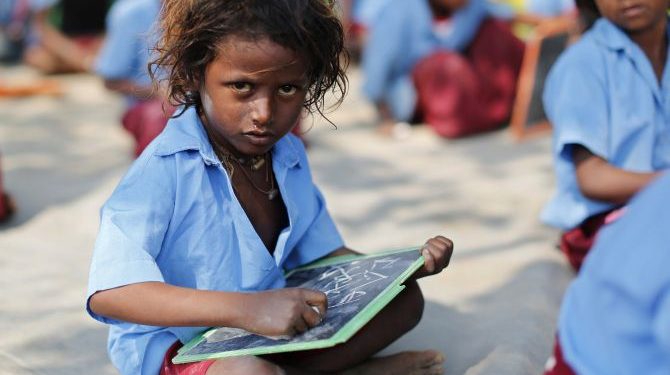Pradeep Kumar Panda
Being in School is not the same as learning. “The name of the dog is Puppy.” This seems like a simple sentence. But in Kenya, Tanzania and Uganda, three out of four third grade students could not understand what it meant. In rural India, nearly three-fourth of third graders are unable to solve a two-digit subtraction; and nearly half the number of fifth graders are unable to solve such problems.
The world is facing a learning crisis. While countries have significantly increased access to education, being in school is not the same thing as learning. Worldwide, hundreds of millions of children reach young adulthood without even the most basic skills, such as calculating the balance from a transaction, following a doctor’s prescription, or understanding a bus schedule — let alone building a fulfilling career or educating children.
Education is at the centre of building human capital. The latest World Bank research shows the productivity of 56 per cent of the world’s children will be less than half of what it could be if they enjoyed complete education and full health.
Delivered well, education – along with the human capital it generates – benefits individuals and societies. For individuals, education raises self-esteem and furthers opportunities for employment and earnings. And for a country, it helps strengthen institutions within societies, drives long-term economic growth, reduces poverty, and spurs innovation.
One big reason why a learning crisis persists is that many education systems across the developing world have little information on who is learning and who is not. As a result, it is hard for them to do anything about it.
And with uncertainty about the kinds of skills the jobs of the future will require, schools and teachers must prepare students with more than basic reading and writing skills. Students need to be able to interpret information, form opinions, be creative, communicate well, collaborate and be resilient.
No change can happen without data. Governments need to know what their education systems are missing — or what’s being done right — to take the right steps to improve
Vision should be for all children and youth to be learning and acquiring the skills they need to be productive, fulfilled, and involved citizens and workers.
Focus should be on helping teachers at all levels become more effective in facilitating learning, improving technology for learning, strengthening management of schools and systems, while ensuring learners of all ages — from preschool to adulthood — are equipped for success.
A growing body of evidence suggests the learning crisis is, at its core, a teaching crisis. For students to learn, they need good teachers — but many education systems pay little attention to what teachers know, what they do in the classroom, and in some cases whether they even show up.
Technology offers new possibilities for teaching and learning. Rapid technological change is raising the stakes. Millions of students are benefitting from the effective use of technology, but millions more in the developing world are not.
Learning happens best when instruction is personalized to meet the needs and strengths of each child, individual progress is tracked, and prompt feedback provided. Adaptive technology can be used to evaluate students’ initial learning level to then walk them through math exercises in a dynamic, personalised way, based on artificial intelligence and what the student is ready to learn.
In a field that is developing at dizzying speeds, innovative solutions to educational challenges are springing up everywhere. Challenge is to make technology a driver of equity and inclusion and not a source of greater inequality of opportunity. All the stakeholders with partners worldwide need to support the effective and appropriate use of educational technologies to strengthen learning.
When schools and educations systems are managed well, learning happens. Providing quality education requires building systems that deliver learning, day after day, in thousands of schools, to millions of students. Successful education reforms require good policy design, strong political commitment, and effective implementation capacity. Of course, this is extremely challenging.
Many countries struggle to make efficient use of resources and very often increased education spending does not translate into more learning and improved human capital. Overcoming such challenges involves working at all levels of the system.
At the central level, ministries of education need to attract the best experts to design and implement evidence-based and country-specific programmes. District or regional offices need the capacity and the tools to monitor learning and support schools. At the school level, principals need to be trained and prepared to manage and lead schools, from planning the use of resources to supervising and nurturing their teachers.
However difficult it may be, change is possible. Through improved school-level accountability by monitoring and limiting teacher and student absenteeism, and the introduction of a merit-based teacher recruitment system, they will be able to increase enrollment and retention of students and significantly improve the quality of education.
No change can happen without data. Governments need to know what their education systems are missing — or what’s being done right — to take the right steps to improve.
By their nature, the payoffs from investing in education require patience and persistence. In fact, it will take a generation to realise the full benefits of high-quality teachers, the effective use of technology, improved management of education systems, and engaged and prepared learners.
As we celebrated the first-ever International Day of Education January 24, we must do all we can to equip our youth with the skills to keep learning, adapt to changing realities, and thrive in an increasingly competitive global economy and a rapidly changing world of work.
The schools of the future are being built today. These are schools where all teachers have the right competencies and motivation, where technology empowers them to deliver quality learning, and where all students learn fundamental skills, including socio-emotional, and digital skills.
Governments, teachers, parents, and the international community must do their homework to realise the promise of education for all students, in every village, in every city, and in every country.
The writer is an economist. e-Mail: pradeep25687@yahoo.co.in.






































